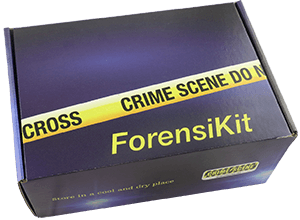
Cassandra Summers interview
Wednesday, January 11, 2023 – 10:30 a.m.
Cassandra Summers represented Veronica Smith in the malpractice suit filed by Kenneth Lemmons.
Detectives Armstrong and Murphy interviewed her at the Yoknapatawpha County Sheriff's Department.
Participants:
- Detective T. Armstrong
- Detective S. Murphy
- Cassandra Summers
Detective Murphy: Thank you for coming in, Ms. Summers. For the record, would you please state your full name and address?
Cassandra Summers: My name is Cassandra Summers. People call me Cassie, and I live at 611 North Lamar. I have a full caseload today, so we need to make this quick, okay?
Detective Armstrong: We're pretty full up ourselves, so I'm sure we can accommodate you.
Cassandra Summers: Wonderful. Can we begin?
Detective Murphy: Tell us a little about your occupation, Cassie.
Cassandra Summers: I am an attorney. I specialize in representing hospitals, clinics, and doctors who are being sued for medical malpractice.
Detective Armstrong: Do you work for yourself then?
Cassandra Summers: I'm a senior partner at Elliot, Summers & James.
Detective Murphy: Were you Dr. Veronica Smith's attorney?
Cassandra Summers: Yes.
Detective Armstrong: What can you tell us about the suit involving the death of Danielle Lemmons?
Cassandra Summers: I can tell you that Mrs. Lemmons's husband, Kenneth, was suing Dr. Smith, her practice, her partners, and Baptist Memorial Hospital.
Detective Murphy: How seriously did Dr. Smith take this lawsuit?
Cassandra Summers: Very. She took it very seriously.
Detective Murphy: Do you believe Mr. Lemmons's case has merit?
Cassandra Summers: We have to treat each case as though it has merit, especially when a person has died.
Detective Murphy: Do you think Mr. Lemmons could win?
Cassandra Summers: That's always a possibility. However, the burden of proof that medical negligence occurred is on the plaintiff's shoulders.
Detective Armstrong: I don't understand. Isn't the fact that his wife is dead proof enough?
Cassandra Summers: No. Let me explain. A medical malpractice suit must involve a mistake or error by a medical professional that damages or harms the patient.
Detective Armstrong: Okay:
Cassandra Summers: The key to any such lawsuit is the "standard of care" or the generally accepted methods used by other professionals in the area to treat or care for patients under the same circumstances. The standards change depending on the patient's age, the medical procedure, and where the patient lives.
Detective Armstrong: Mrs. Lemmons underwent a routine procedure during which her colon was perforated. She became septic and died. Are you telling us there's a standard set for that?
Cassandra Summers: There is a standard for everything, detective. We do not believe that Dr. Smith was negligent. Moreover, the patient is always fully briefed on the risks of any procedure, which includes the possibility, however slight, of death.
Detective Armstrong: Fully briefed?
Cassandra Summers: Before any medical action is taken, the physician thoroughly goes over everything about the procedure, including the known risks, and answers any questions the patient has. Then the patient signs a consent form, which acknowledges that they're aware of the risks and benefits of the procedure and authorizes the procedure.
Detective Murphy: So you're saying Mrs. Lemmons knew what she was getting into and that excuses the fact that Dr. Smith perforated her colon?
Cassandra Summers: That's not what I'm saying at all. Let me continue. I'm saying the patient gave her informed consent and accepted the risks. This kind of lawsuit has been tried before without much success. The precedent has already been set.
Detective Armstrong: Are you saying it's the patient's fault she died?
Cassandra Summers: No, I am not saying that. Stop putting words in my mouth. I'm getting the feeling you think I'm a cold individual with no compassion for a man who lost his wife. Let me assure you that's not the case. I've lost loved ones. I know how it feels. But I'm an attorney who's been hired to fight a malpractice case and fight it, I shall.
Detective Murphy: Are you confident that you could win?
Cassandra Summers: If we went to trial, yes, I am. But these types of lawsuits take years, and most of the time, the parties will settle to reduce expenses and resolve the situation quickly.
Detective Armstrong: What did Dr. Smith want the outcome to be?
Cassandra Summers: She wanted to settle. She didn't want it to drag out and go to court.
Detective Armstrong: Was she afraid she was going to lose?
Cassandra Summers: Not necessarily. She felt bad about Mr. Lemmons's loss, and she wanted him to know we were taking this seriously.
Detective Murphy: She felt guilty then?
Cassandra Summers: Again, please stop putting words in my mouth. I did not say that. She did tell me she wanted to contact him to tell him how sorry she was for his loss. I told her that until the case was resolved, she was to have no contact with him whatsoever.
Detective Armstrong: Why's that?
Cassandra Summers: If she gave any indication she was distressed about the outcome or even so much as expressed her condolences, Mr. Lemmons's attorney could use that as an admission of culpability on her part, even if that wasn't what she meant.
Detective Armstrong: How did she take your instruction not to contact Mr. Lemmons?
Cassandra Summers: She didn't like it, but she promised to abide by my request.
Detective Murphy: What was the status of the case at the time Dr. Smith died?
Cassandra Summers: We were preparing to make an initial offer. That wasn't my preference, but the insurance company and Dr. Smith wanted to see if we could make it go away quickly.
Detective Armstrong: What was your offer going to be?
Cassandra Summers: I'm not going to get into specifics, but the strategy was to start low and work from there.
Detective Murphy: Did Dr. Smith ever tell you she was receiving any harassing text messages?
Cassandra Summers: No, she didn't. Do you have any evidence those messages were related to this lawsuit? That would be one more arrow in our quiver.
Detective Murphy: Did she mention that her car had been vandalized?
Cassandra Summers: I know nothing about that. If you don't have any evidence connecting these things to the Lemmons lawsuit, I really need to get going. Can we finish up here?
Detective Armstrong: Just one more question. What happens now that your client has died?
Cassandra Summers: The suit will go on. I really must leave now. I have to be in court on another matter.
Detective Murphy: Thank you for your time. We appreciate it.
Cassandra Summers: Thank you. Good day.
Interview ended – 10:49 a.m.

